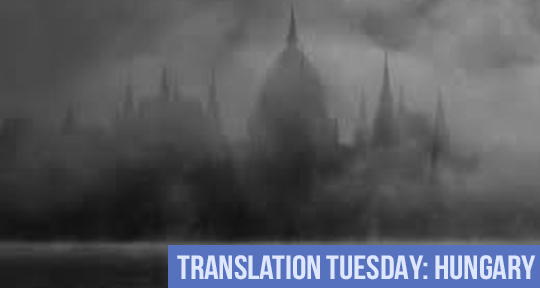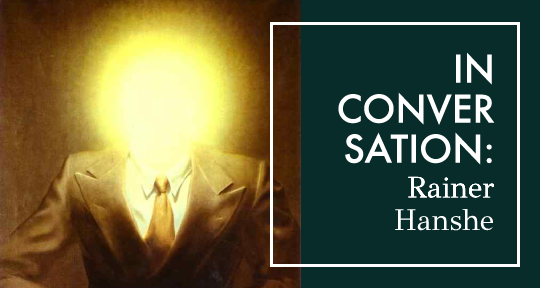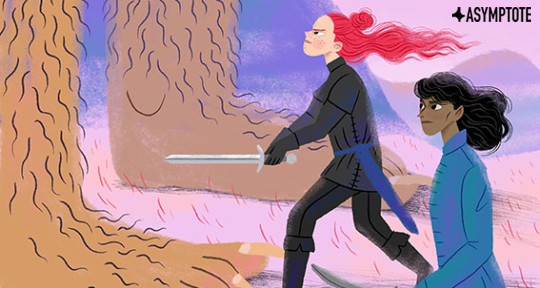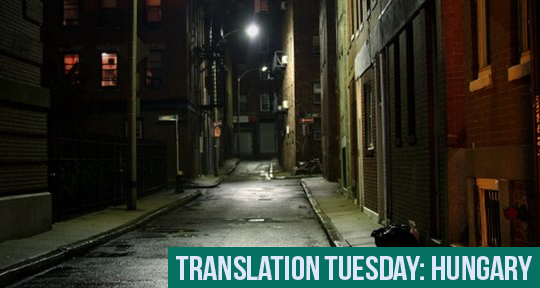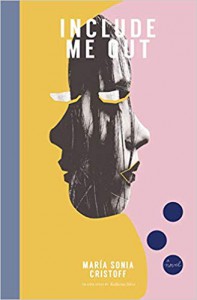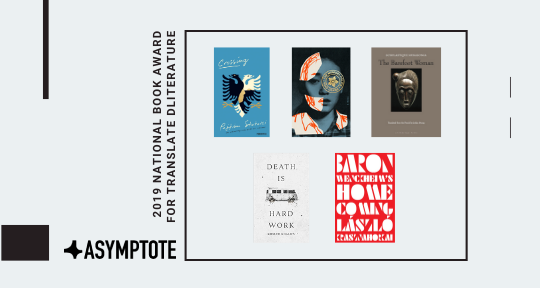Since its inception in 2016, the Educational Arm has developed instructional materials to accompany select pieces from the nonfiction, fiction, poetry, drama, and visual sections of each issue of Asymptote. Now with twenty Educator’s Guides in our archive, and over one hundred lesson plans based on translations from over fifty different languages, teachers can truly experience the world with their students. We encourage educators to explore the myriad of ways Asymptote content can be adapted and used in their curriculums; most lessons can be readily applied in literature courses at the high school or university level, but are also flexible enough to be adapted for a variety of humanities classes such as English, creative writing, cultural studies, and modern languages. They can also be easily applied to engage lifelong learners at community centers or arts organizations.
The Summer 2021 Educator’s Guide features lesson plans based on a diverse array of texts from the latest issue of Asymptote, including nonfiction translated from Czech and Spanish, poetry from Brazil and Iceland, and visual art inspired by China and the U.S. In these lessons, students are invited to observe urban life through the lens of psychogeography; explore the multifaceted relationship between art, memory, and cultural identity; research poets and critically examine the concept of literary canon; and delve into the translation process while reflecting on their own experiences reading works in translation. We hope that the Educator’s Guide will serve as a springboard for the use of world literature in your own classroom.
In this following roundtable, four members of the Educational Arm—representing a variety of teaching contexts—sit down for a discussion about the Educator’s Guide. Anna Rumsby (English language teaching, U.K./Germany), Mary Hillis (English language teaching, Japan), Kent Kosack (creative writing, U.S.), and Kasia Bartoszynska (literature, U.S.) discuss their favorite lessons from previous Educator’s Guides—why they chose the pieces in question, how they adapted them, with additional discourse on teaching through the pandemic and the importance of reading world literature.
Mary Hillis (MH): How does translated literature fit into your teaching practice? Have you taught any lessons from the Educator’s Guide, or do you have any favorite lessons from previous guides?
Anna Rumsby (AR): I teach English to German speakers; most of my lessons revolve around the German school system, and therefore involve rather more pedestrian areas such as grammar and traditional style essays. As a relatively new addition to the Education Arm, I was deeply impressed and invigorated by the creative freedoms we enjoy in producing the incredibly unique material at hand, working from some incredibly talented authors and translators. It definitely highlighted what had sometimes been lacking for me in my other work. I suppose that, in a way, working on the Educator’s Guide means I can design lessons which I would love to teach, rather than those I teach day to day.
In the Fall 2020 Educator’s Guide, I was particularly struck by the lesson plan called “Writing About What is Lost,” on “Living Trees and Dying Trees” by Itō Hiromi, translated by Jon L. Pitt. I am a great lover of both folklore and the botanical world; my MA dissertation involves a lot of Black Forest folklore, and my partner is a gardener, so the exercise on the importance and meaning of trees in Japanese culture really struck me. It reminded me of strolling through botanical gardens in the pre-COVID age, being told the Latin names and significance of all the trees I pointed at. I love how the lesson plan uses Itō Hiromi’s work as a springboard for further research, which in turn explores specific topics in more depth.
Kent Kosack (KK): I’m glad you mentioned “Writing about What is Lost.” It’s a great example of what teaching world literature and literary translation can do—letting the students explore a different place, a culture or sensibility, and using it to learn more about the wider world. By the end of the lesson, they’re making connections to their own lives and—in this case—reflecting on what’s been lost. It’s difficult work, but especially during this pandemic, necessary and potentially cathartic. READ MORE…



